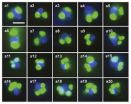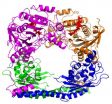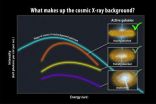(Press-News.org) Breast cancer patients who have a strong social support system in the first year after diagnosis are less likely to die or have a recurrence of cancer, according to new research from Vanderbilt-Ingram Cancer Center (VICC) and the Shanghai Institute of Preventive Medicine. The study, led by first author Meira Epplein, Ph.D., assistant professor of Medicine at VICC, was published in a recent edition of the Journal of Clinical Oncology.
Patients in the study were enrolled in the Shanghai Breast Cancer Survivor Study, a large, population-based review of female breast cancer survivors in China, which Vanderbilt University Medical Center and the Shanghai Institute of Preventive Medicine have carried out since 2002 under the leadership of principal investigator Xiao Ou Shu, M.D., Ph.D., professor of Medicine at VICC, and senior author of the study.
From 2002 to 2004, a total of 2,230 breast cancer survivors completed a quality of life survey six months after diagnosis and a majority responded to a follow-up survey 36 months after diagnosis. The women were asked about physical issues like sleep, eating and pain, psychological well-being, social support and material well-being. The answers were converted to an overall quality of life score.
During a median follow-up of 4.8 years after the initial quality of life assessment, the investigators documented participants who had died or been diagnosed with a cancer recurrence.
Six months after diagnosis, only greater social well-being was significantly associated with a decreased risk of dying or having a cancer recurrence. Compared to women with the lowest scores, women who scored highest on the social well-being quality of life scale had a 48 percent reduction in their risk of a cancer recurrence and a 38 percent reduction in the risk of death.
Emotional support was the strongest predictor of cancer recurrence. Specifically, women reporting the highest satisfaction with marriage and family had a 43 percent risk reduction, while those with strong social support had a 40 percent risk reduction and those with favorable interpersonal relationships had a 35 percent risk reduction.
"We found that social well-being in the first year after cancer diagnosis is an important prognostic factor for breast cancer recurrence or death," said Epplein. "This suggests that the opportunity exists for the design of treatment interventions to maintain or enhance social support soon after diagnosis to improve disease outcomes."
While a strong social support network influenced cancer recurrence and mortality during the first year, the association tapered off and was no longer statistically significant by the third year after diagnosis. This may be related to a smaller sample size of patients who answered the questionnaire, or other factors beyond quality of life that take precedence in later years.
"Our research supports previous studies that found a benefit for breast cancer patients who have a meaningful emotional support network," said Epplein. "These results suggest that therapeutic interventions may be useful because social well-being is potentially modifiable."
###
The study was supported by grants from the U.S. Department of Defense Breast Cancer Research Program and the National Cancer Institute.
Strong social ties benefit breast cancer patients
2011-01-21
ELSE PRESS RELEASES FROM THIS DATE:
Newly discovered group of algae live in both fresh water and ocean
2011-01-21
A team of biologists has discovered an entirely new group of algae living in a variety of marine and freshwater environments. This group of algae, which the researchers dubbed "rappemonads," have DNA that is distinctly different from that of other known algae. In fact, humans and mushrooms are more closely related to each other than rappemonads are to some other common algae (such as green algae). Based on their DNA analysis, the researchers believe that they have discovered not just a new species or genus, but a potentially large and novel group of microorganisms.
The ...
Red blood cell hormone modulates the immune system
2011-01-21
New research reveals that a hormone best known for stimulating the production of red blood cells can modulate the immune response. The study, published by Cell Press in the January 27th issue of the journal Immunity, finds that erythropoietin (EPO) has contrasting influences on infectious and inflammatory diseases and may be useful in the design of new therapeutic strategies.
EPO is a cytokine hormone that stimulates the production of red blood cells by acting at EPO receptors (EPORs) on red blood cell precursors. Interestingly, other cell types also express EPORs. ...
Controlling symptoms can lead to improved quality of life for end-of-life patients
2011-01-21
LOUISVILLE, Ky. – Healthcare workers can most directly affect quality of life (QOL) of patients with advanced stage lung cancer by helping manage symptoms such as pain, lack of energy, shortness of breath, coughing, difficulty sleeping and dry mouth, according to a study recently published in the journal Oncology Nursing Forum.
Understanding the symptoms, particularly symptom distress - or the degree to which a symptom bothers a person, is crucial to improved patient care. Intervention at the time of diagnosis is important because patients with stage IIIb or IV lung cancer ...
Go figure: Math model may help researchers with stem cell, cancer therapies
2011-01-21
The difficult task of sorting and counting prized stem cells and their cancer-causing cousins has long frustrated scientists looking for new ways to help people who have progressive diseases.
But in a development likely to delight math teachers, University of Florida researchers have devised a series of mathematical steps that accomplishes what the most powerful microscopes, high-throughput screening systems and protein assays have failed to do — assess how rapidly stem cells and their malignant, stemlike alter egos increase their numbers.
The method, published in the ...
How the hat fits: Structural biology study reveals shape of epigenetic enzyme complex
2011-01-21
To understand the emerging science of epigenetics—a field that describes how genes may be regulated without altering the underlying DNA itself—scientists are deciphering the many ways in which enzymes act on the proteins surrounding DNA within cells.
One type of these enzymes, proteins known as histone acetyltransferases (HATs), act on DNA by modifying DNA-bound proteins called histones. This act of modification, called acetlyation, can dictate how histones interact with DNA and other proteins affecting processes such as DNA replication, transcription (reading the gene), ...
State of the Union 2011: Will President Obama commit to R&D, for jobs and economic growth?
2011-01-21
Research!America's chair, former Congressman John E. Porter (R-IL), and Research!America's CEO, Mary Woolley, issued the following statement in anticipation of President Barack Obama's State of the Union address.
Porter said, "I think the president understands that science, technology, innovation and research are where we lead the world and where we must make the ongoing investments to maintain that leadership. But he must, both in his State of the Union speech next Tuesday night and in the Budget he submits to Congress, make the case to both the American people and ...
NASA prepares to launch next Earth-observing satellite mission
2011-01-21
WASHINGTON -- NASA's newest Earth-observing research mission is nearing launch. The Glory mission will improve our understanding of how the sun and tiny atmospheric particles called aerosols affect Earth's climate. Glory also will extend a legacy of long-term solar measurements needed to address key uncertainties about climate change.
Glory is scheduled to launch from Vandenberg Air Force Base in California on Feb. 23 at 5:09 a.m. EST. It will join a fleet called the Afternoon Constellation or "A-train" of satellites. This group of other Earth-observing satellites, including ...
Swift survey finds 'missing' active galaxies
2011-01-21
Seen in X-rays, the entire sky is aglow. Even far away from bright sources, X-rays originating from beyond our galaxy provide a steady glow in every direction. Astronomers have long suspected that the chief contributors to this cosmic X-ray background were dust-swaddled black holes at the centers of active galaxies. The trouble was, too few of them were detected to do the job.
An international team of scientists using data from NASA's Swift satellite confirms the existence of a largely unseen population of black-hole-powered galaxies. Their X-ray emissions are so heavily ...
Gulf grows between research practice and participant preferences in genetic studies
2011-01-21
Obtaining consent for genetic studies can be an opportunity for researchers to foster respectful engagement with participants, not merely to mitigate legal risk. This shift is proposed in a policy forum appearing tomorrow, Jan. 21, in Science, the journal of the American Academy for the Advancement of Science.
The authors of the article, "Research Practices and Participant Preferences: The Growing Gulf" recommend new approaches that treat participants as true stakeholders in research, who willingly take on risks because they believe the potential benefits to society ...
Cell binding discovery brings hope to those with skin and heart problems
2011-01-21
A University of Manchester scientist has revealed the mechanism that binds skin cells tightly together, which he believes will lead to new treatments for painful and debilitating skin diseases and also lethal heart defects.
Professor David Garrod, in the Faculty of Life Sciences, has found that the glue molecules bind only to similar glue molecules on other cells, making a very tough, resilient structure. Further investigation on why the molecules bind so specifically could lead to the development of clinical applications.
Professor Garrod, whose Medical Research Council-funded ...




